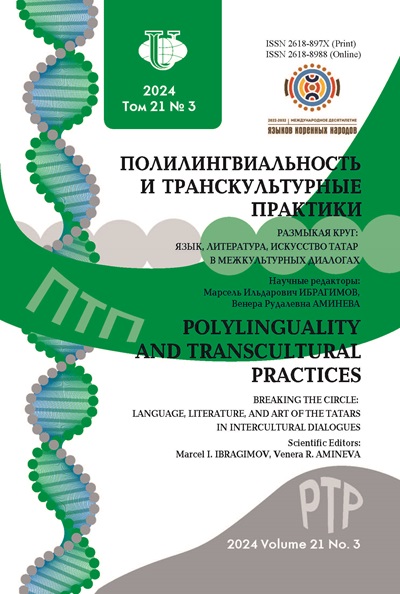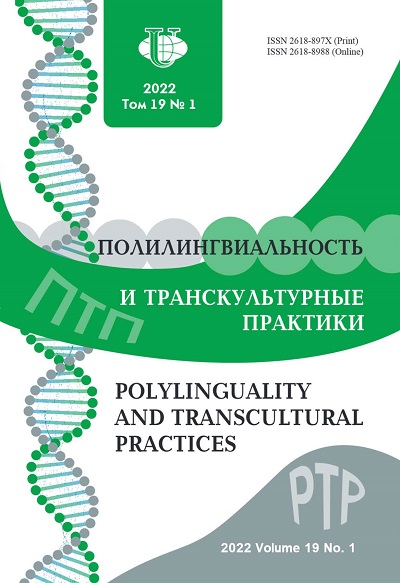Russian Language Classes through Thematic Learning “About the Country, about the Homeland, about the Human”: Metasubject Aspect
- Authors: Nikolaenko S.V.1
-
Affiliations:
- Vitebsk State University named after P.M. Masherov
- Issue: Vol 19, No 1 (2022)
- Pages: 107-116
- Section: Bilingual education
- URL: https://journals.rudn.ru/polylinguality/article/view/30499
- DOI: https://doi.org/10.22363/2618-897X-2022-19-1-107-116
Cite item
Full Text
Abstract
In the educational process of acquiring or learning languages, humanitarian knowledge and related skills (both academic and extracurricular, also termed as hard and soft skills) are responsible for not only a native speaker’s cognitive activity, but also for their behavioral scenarios. This statement ensures the relevance of this research. The objective of the article is to determine methodological recommendations that can be used in Russian language classes at educational institutions of the Republic of Belarus which aim at preserving regional / national “places and images of memory” presented in fiction and journalistic texts. The material that is used in class comprises texts created by Marc Chagall, Robert Rozhdestvensky, David Simanovich that aim at educating the generational trajectory by means of the language.
About the authors
Sergey Vladimirovich Nikolaenko
Vitebsk State University named after P.M. Masherov
Author for correspondence.
Email: ns-lk@mail.ru
ORCID iD: 0000-0001-7749-6671
Doctor of Pedagogical Sciences, professor, Dean of Faculty of Humanities and Language Communication
33, Moskovskij prospekt, Vitebsk, 210038, Republic of BelarusReferences
- Buslaev, F.I. 2019. O prepodavanii otechestvennogo yazyka. Moscow: Yurajt publ. Print. (In Russ.)
- Zhukova, I.N., Lebed’ko, M.G., Proshina, Z.G. and Yuzefovich, N.G. 2013. Slovar’ terminov mezhkul’turnoj kommunikacii. Eds. M.G. Lebed’ko and Z.G. Proshina. Moscow: Flinta: Nauka publ. Print. (In Russ.)
- Solodilova, I.A. 2009. “K voprosu o sootnoshenii ponyatij «emociya» i «kogniciya»”. Vestnik Bashkirskogo gosudarstvennogo universiteta 4: 1348—1351. Print. (In Russ.)
- Murina, L.A. 2010. Sovremennaya ritorika: osnovy rechevogo obscheniya: 11 klass: posobie dlya uchaschikhsya obrazovatel’nykh uchrezhdenij s belorusskim i russkim yazykami obucheniya. Minsk: Narodnaya asveta publ. Print. (In Russ.)
- Nikalayenka, S.V. 2015. Teoriya i praktika sociokul’turnogo razvitiya uchaschikhsya 5—11 klassov: nacional’no-kul’turnyj soderzhatel’nyj aspect v kontekste obucheniya russkomu yazyku. Vitebsk: VGU imeni P.M. Masherova publ.
- Brileva, I.S., Vol’skaya, N.P. Gudkov, D.B., Zakharenko, I.V. & Krasnykh, V.V. 2014. Russkoe kul’turnoe prostranstvo: lingvokul’turologicheskij slovar. Issue 1. Moscow: Gnosiz publ. Print. (In Russ.)
- Chagall, M. K moemu gorodu Vitebsku. Web. https://stihi.ru/2018/06/15/6495.
- Rozhdestvensky, R. Marc Chagall. Web. https://rustih.ru/.
- Simanovich, D. Moj Chagall. Web. https://stihi.ru/diary/vyuga62/2015-12-20.
- Dejkina, A.D., and Levushkina, O.N. 2014. “Metodicheskij potencial lingvokul’turologicheskikh kharakteristik teksta v shkol’nom obuchenii russkomu yazyku”. Russkij yazyk v shkole 4: 12—17. Print. (In Russ.)















